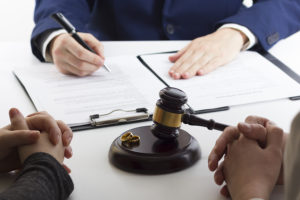In a criminal case, evidence can make all the difference in whether a not a defendant is convicted of a  crime. During the criminal process, the prosecutor begins the trial with an opening statement and the defendant either makes an opening statement at that time or when his defense begins. The prosecutor then presents evidence, including witnesses, documents, and physical evidence. When the prosecutor is finished, the defendant presents evidence. Rebuttals are then permitted, and the case is then sent to a jury who makes a decision after considering all evidence presented on both sides.
crime. During the criminal process, the prosecutor begins the trial with an opening statement and the defendant either makes an opening statement at that time or when his defense begins. The prosecutor then presents evidence, including witnesses, documents, and physical evidence. When the prosecutor is finished, the defendant presents evidence. Rebuttals are then permitted, and the case is then sent to a jury who makes a decision after considering all evidence presented on both sides.
The evidence that is presented during the trial phase cannot just consist of any and all information that prosecutors and defendants want the jury to know. There are strict rules for evidence to ensure that proceedings are fair and that the jury is getting the information they need. Knowing the rules of evidence is important both when building your own strategy for presenting information to the jurors and when trying to keep the prosecutor from being allowed to use damaging evidence against you.
The rules of evidence are extremely complicated, and experienced Las Vegas criminal defense lawyers with knowledge of these complex rules should be consulted to provide assistance. Your attorney will help you to try argue to keep evidence out of court that hurts you and will help try to ensure you are able to present the evidence you need to defend against charges. Call LV Criminal Defense today to learn more about the rules of evidence and about the ways in which we can help.
Within the Nevada laws related to criminal procedure, there is a section of the code providing details on what happens during a criminal trial. Within this code section, N.R.S. 175.221 establishes the basic guidelines for evidence in criminal proceedings.
According to N.R.S. 175.211, witness testimony should always be taken orally in open court unless a statute provides for another method of delivering testimony. The same code section also makes clear that there are specific guidelines the court must consider when determining if evidence is admissible or not.
For instance, the court has to consider the provisions found in Title 4 of the Nevada Revised Statutes; and has to consider rules set forth in any other statute. If there is no statutory rule determining if evidence should be admitted, the court should consider common law and rulings made in past court cases. The reason and experience of the court can also be a guideline if there is no specific statute and no similar past rules on whether a particular kind of evidence should be admitted or not.
Nick Wooldridge has a long track record of representing clients accused of serious federal and state crimes in Nevada.
Provisions found in Title 4 address when documents and physical evidence can be presented. These provisions also deal with witness testimony, prohibit hearsay except in certain limited exceptions, and set forth requirements for expert witnesses who provide testimony on the basis of their credentials. Chapter 47 through 56 of Title 4 have extensive details on each different common type of evidence which prosecutors and defendants may wish to present during a criminal case.
Rules on the admissibility of evidence are some of the most complex rules of criminal procedure, and are also some of the most important rules. If you can keep a prosecutor from presenting evidence which hurts your case while getting your own evidence admitted, this can make all the difference in terms of whether you will be acquitted or will be found guilty of the offense which you have been accused of.
LV Criminal Defense knows the rules of evidence and is prepared to help you to develop effective strategies to make the strongest defense possible and to try to undermine the prosecutor’s case. Give us a call as soon as possible so our Las Vegas defense lawyers can get started on helping you make the rules of evidence work for you.